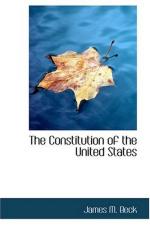Had this de facto government assumed the plenary powers which provisional governments must, under similar circumstances, necessarily assume, it would have been better for the cause of the colonists. For want of an efficient central government, the civil administration of the infant nation was marked by a weakness and incapacity that defeated Washington’s plans and nearly broke his spirit. Washington’s little army was the victim of the gross incapacity of an impotent government. The soldiers came and went, not as the general commanded, but as the various colonies permitted. The tragedy of Valley Forge, when the little army nearly starved to death, and literally the soldiers could be tracked over the snows by their bleeding, unshod feet, was not due to lack of clothing and provisions, but to the gross incapacity of a headless government that if it had had the wisdom to act lacked the authority. The situation was one of chaos. The colonies recruited their own contingents, paid such taxes as they pleased, which grew increasingly less, and the Congress had no coercive power to enforce its policies, either with reference to internal or external affairs. This situation was so clearly recognized that immediately after the Declaration of Independence on July 4, 1776, the draft of a constitution was proposed to give the central government more effective power; but, although the necessity was manifest and most urgent, the so-called Articles of Confederation, which were then drafted in 1776, were never finally adopted by the requisite number of States until March, 1781, when the war was nearly over. As the result proved, they marked only a very small advance over the existing de facto government, for the constituent States were still too jealous of each other and too hostile to the creation of a central government to form a truly effective government. The founders of the Republic could only learn from their errors, but it is their great merit that they had the ability to profit in the stern school of experience, of which Franklin has said that it is a “dear school, but fools will learn in no other.”
The founders of the Republic were not fools, and while they did not, as Gladstone seems to intimate, have the inspired wisdom to develop a wonderful Constitution by sheer intuition unaided by experience, they did have the ability to make of their very errors the stepping-stones to a higher destiny.




